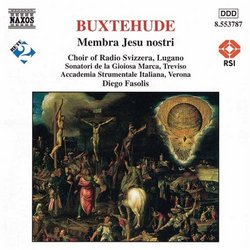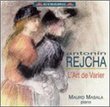| All Artists: Johann Rosenmuller, Dietrich Buxtehude, Diego Fasolis, Roberto Balconi, Sonatori de la Gioiosa Marca, Verona Accademia Strumentale Italiana, Roberta Invernizzi, Catherina Trogu-Rohrich, Mario Cecchetti Title: Buxtehude: Membra Jesu nostri Members Wishing: 0 Total Copies: 0 Label: Naxos Release Date: 8/5/1997 Genre: Classical Styles: Opera & Classical Vocal, Historical Periods, Baroque (c.1600-1750), Symphonies Number of Discs: 1 SwapaCD Credits: 1 UPC: 730099478724 |
Search - Johann Rosenmuller, Dietrich Buxtehude, Diego Fasolis :: Buxtehude: Membra Jesu nostri
 | Johann Rosenmuller, Dietrich Buxtehude, Diego Fasolis Buxtehude: Membra Jesu nostri Genre: Classical
|
Larger Image |
CD DetailsSimilar CDs
|
CD ReviewsGood performance of a curious work S. Gustafson | New Albany, IN USA | 06/16/2001 (4 out of 5 stars) "I was unfamiliar with this particular piece until I came across this recording. Buxtehude's -Membra Jesu Nostri-, a title that, as the notes say, "defies elegant translation" [literally, Our Jesus' Body Parts] is a setting of a rhymed Latin poem by St. Bernard of Clairvaux. The central conceit of the poem is to address the several body parts of the crucified Christ: his feet, his knees, his hands, his side, his chest, and his heart. Buxtehude creates a small cantata on each of these segments, and introduces them with a contrapuntal five-part setting of a related verse of Scripture. The cantatas themselves are linked thematically, and by the use of instrumental ritornelli. The combination of chorus, arias for one or several soloists, and instrumental ritornelli into a single work creates an overall impression similar to Monteverdi's Vespers. Those who love the Vespers as much as I do may also find this work congenial. The recording and the performance are clear, if somewhat quiet." An excellent recording of a familiar work Steven Guy | Croydon, South Australia | 12/01/2006 (5 out of 5 stars) "There are a number of fine recordings of the Membra Jesu nostri now available. This one ranks very high, in my opinion. I like it every bit as much as Gardiner's, made with his Monteverdi Choir and English Baroque Soloists for the ARCHIV label. Diego Fasolis has some excellent soloists, in particular, Roberta Invernizzi [soprano]. The Choir of Radio Svizzera, Lugano is in fine form and they provide the ripieni during the tutti sections. The Sonatori de la Gioiosa Marca, Treviso are in great form and I like all their recordings (I have a few). The interpretation of the Membra Jesu nostri is very good - gracefully expressive and poignant, much of the time, and sober and splendid, when the music calls for it. This is possibly Dieterich Buxtehude's greatest work. I have studied the score and it is my dream to sing in a performance of this work one day! The Sinfonia XI by Johann Rosenmüller gives us a tiny glimpse of this equally great and, sadly, neglected (today) composer. It is performed with great style and precision by the instrumental ensembles here. I hope Diego Fasolis and his ensembles eventually devote an entire disc to the art of Rosenmüller - perhaps his Venetian Vespers? This recording of the Membra Jesu Nostri & Sinfonia by Rosenmüller is one of the best recordings of Baroque music released on the NAXOS label. Lovers of Baroque music and great musical works of art need not hesitate." A Monument of baroque Music Giordano Bruno | Wherever I am, I am. | 01/28/2009 (5 out of 5 stars) "Monarchy and monotheism are 'Siamese twins,' conjoined at the breast and sharing a single heart. If there's anything the history of the past two hundred fifty years has proven, it's that no surgery can successfully separate them. We music lovers are essentially still monarchists and monotheists; we have enshrined our monarchs and we tend to guard their sanctity with our listening lives.
JS Bach's coronation as the supreme deity of German Baroque was not unpolitical; the cabal of king-makers were chiefly North German Lutheran nationalist musicologists. In no way do I wish to dethrone Bach. Bach is incomparable, and yet not beyond comparison. I'm sure I'll be accused of treason and heresy, but to my democratic ears the music of Dietrich Buxtehude (1637-1707) compares quite well with that of the 50-years younger composer who walked all the way across Germany just to hear him play the organ. For most of the 20th Century, and for the majority of music lovers today, the adulation of Bach has precluded the recognition that Buxtehude, Fux, Pachelbel, and others deserve in the pantheon of major composers. "Membra Jesu Nostri" is a cycle of seven concertante cantatas for five voices and chamber orchestra, based on mystical devotional Latin poems by Bernard of Clairvaux. Each cantata pays devotion to a 'member' of the crucified Messiah's body: feet, knees, hands, side, breast, heart, and face. The whole cycle reminds me strongly of Joseph Haydn's sublime "Seven Last Words," written a hundred years later. Both works are sustained expressions of awe and reverence, composed entirely in meditative adagio tempi yet without sounding the least bit sluggish or maudlin. Though Buxtehude was a Dane who spent his entire career in a small triangle of North Germany and Denmark, his vocal music was thoroughly cosmopolitan, far more so than the devoutly provincial Bach. "Membra Jesu Nostri" is utterly Italianate in expression, revealing very clearly Buxtehude's inheritance of the style of Heinrich Schütz. There are nine performances of "Membra Jesu Nostri" available on CD, and one of them is also available on DVD. Amazingly, they are all better than adequate; there are no clunkers. What a testimony to the esteem this cycle of cantatas merits from the major conductors of historically informed music: Jacobs, Gardiner, Suzuki, Junghanel, etc. This performance, led by Diego Fasolis, is tied, in my opinion, with that of Rene Jacobs and his Concerto Vocale ensemble. Primarily it's the technique and style of the sopranos that separates the very good from the very best. Roberta Invernizzi is among the very best." |

 Track Listings (36) - Disc #1
Track Listings (36) - Disc #1